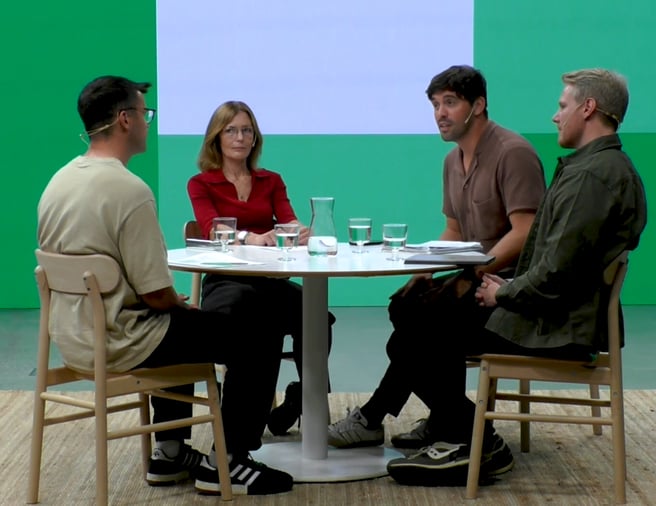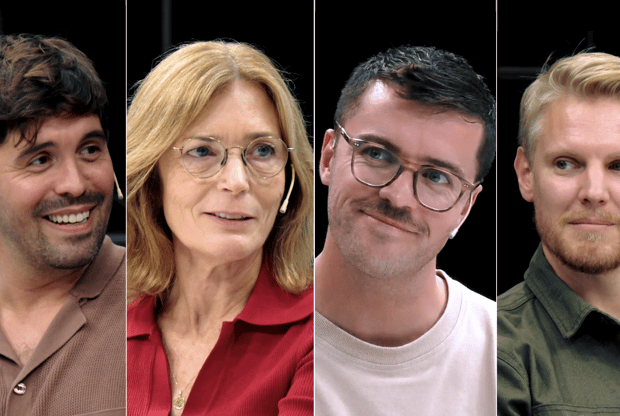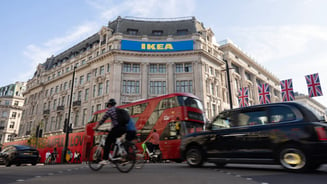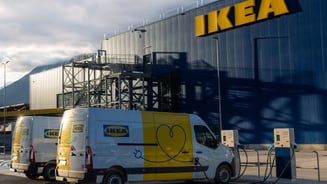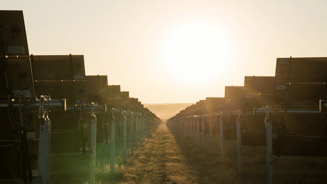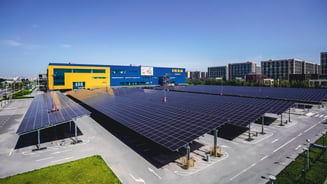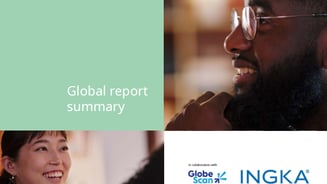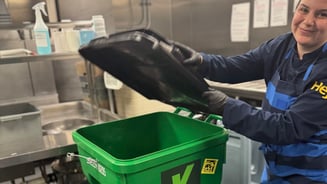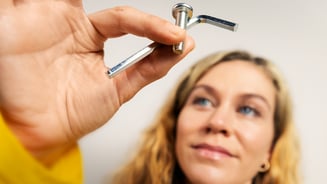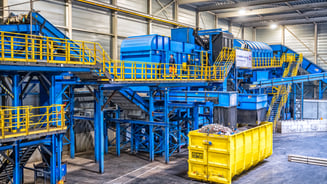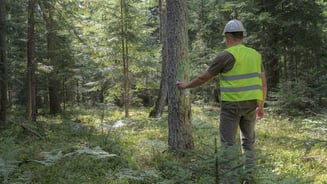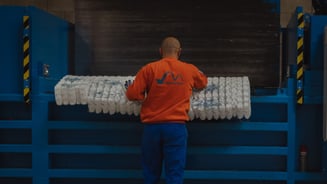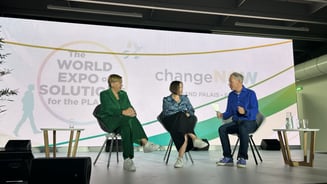As part of deepening our understanding of the latest 2025 People and Planet Consumer Insights and Trends report, we invited Caroline Holme, Executive Director at GlobeScan, Dr Patrick Elf, Associate Professor of Sustainable Business at Middlesex University, and Connor Hill, Head of Circular & Sustainable Living at Ingka Group, to join the first People & Planet roundtable discussion.
The study surveyed over 30 countries and 30,000 respondents on attitudes toward climate, inequality and sustainable living. Building on its insights, the group discussed what helps people move from good intentions to meaningful everyday action – and what businesses can do to help close the intention–action gap.
What the research shows – and how business can help
Opening the discussion, Caroline Holme from GlobeScan shared key insights from the study. The data shows that while public concern about climate change remains high, most people expect help from both government and business to turn that concern into action.
“We’ve been tracking this for several years now,” she said. “Forty-six percent say lack of government support is the biggest barrier to acting, and people still want better communication from companies about their social and environmental impact.”
She added that many people want to make a difference but are unsure where to start or which actions matter most.
“They really need help prioritising what has the biggest impact — and understanding what difference their own actions make,” Holme explained. “Right now, most don’t have a clear sense of that.”
Connor Hill, Head of Circular & Sustainable Living at Ingka Group, agreed that businesses have a clear role to play in making sustainable living easier and more accessible.
“When we think about IKEA, we think about the home. And that’s where people can make real change,” he said. “Some of the biggest individual impacts are around eating more plant-rich foods, cutting food waste and improving energy efficiency. For us, a huge part of the work is making sustainability affordable for the many. You need to think about the solutions that work for everyone – and make sustainability affordable.”
Hill said thoughtful product choices can make it easier for people to do the right thing without having to think twice.
“We only sell rechargeable batteries,” he added. “We take that decision away from the customer, and by doing it at scale, we can drive down prices. That’s how we make sustainability affordable.”
When small steps lead to bigger change
The discussion then turned to the role of everyday behaviour. The panel agreed that while policies and products matter, lasting change starts with people and the choices they make at home.
Dr Patrick Elf, Associate Professor of Sustainable Business at Middlesex University, described what behavioural scientists call the spillover effect, where small actions can trigger broader lifestyle changes.
“There’s something called the behavioural spillover effect, where one small action leads to another,” he said. “The academic research is mixed, but in our Live Lagom project with IKEA in the UK, we saw that these behaviours really did spill over. It worked because people were supported and connected with others in the same situation.”
Elf said those early wins can help people build confidence and momentum over time.
“Those smaller behaviours became stepping stones toward more difficult but more impactful ones,” he said.
Affordability and action in everyday life
Affordability emerged as a central theme in the discussion – not just as a question of price, but of access. Connor Hill explained that for Ingka Group, making sustainable living attainable for more people means designing products, services and systems that save both resources and money over time.
“When we say we’re for the many, we mean that sustainability has to be affordable and accessible for the many,” he said. “If it’s only for the few, we won’t move the needle. Using more recycled materials can help us lower costs, and designing for durability means our products last longer for customers.”
Hill pointed to the company’s growing range of circular services, such as repair, buy-back and resell, as proof of how that idea comes to life in practice.
“Last year alone, we sent out more than 20 million spare parts,” he said. “That helps us say to customers: buy your product with us and we’ll help you make it last. When you’re finished with it, our buy-back offer means we repair, clean and resell it at a lower price. It keeps furniture in use longer, and makes it more affordable for someone else.”
Food waste was another example of how small, simple actions can add up to big savings at home.
“In the UK, families waste about £400 worth of food every year,” Hill noted. “This year, our big focus is cooking and eating – and we’ll have a major push around food waste: how to store food better, what to do with leftovers, and how to save money in the process.”
Hill added that reducing waste is just one of many ways people can make a measurable difference at home. Independent research backs this up; according to Project Drawdown, some of the most impactful household actions include eating more plant-rich meals, cutting food waste and improving energy efficiency.
Honesty builds trust
The conversation then turned to how companies can talk about sustainability in a way that feels credible and human. Caroline Holme said that while the risks of greenwashing are real, staying silent isn’t an option either.
“The majority of people want to hear this information,” she said. “Greenwashing isn’t an option – but neither is silence. People want transparency: not just about successes and targets achieved, but also about what’s difficult. That openness is what builds trust.”
Dr Patrick Elf agreed, adding that authenticity also comes from being willing to share the learning process.
“You can’t be afraid to try things out,” he said. “Progress isn’t perfect, but the willingness to do and learn is what really counts.”
What Ingka Group is exploring
Closing the discussion, Connor Hill reflected on how the insights from the 2025 People and Planet Consumer Insights and Trends report are helping shape Ingka Group’s work across different markets.
“This research helps our country teams shape their plans,” he said. “Each market uses the insights to decide what products, services and communications will have the biggest impact locally. It’s exciting to see how markets take these findings and test new ideas. It’s not one solution for all, it’s about trying, learning and scaling what works.”
Hill said this process of testing and scaling extends beyond products – it also shapes how Ingka Group advocates for wider change, works with partners and supports customers in living more sustainably.
Examples include:
- Circular services — scaling care, repair, buy-back and resell programmes to prolong product life.
- Cooking & Eating — In 2026, the focus is on helping customers reduce food waste and eat more sustainably.
- Designing for circularity — new design principles to IKEA icons like BILLY and PAX to make them easier to repair, reuse and recycle.
- Advocacy and partnerships — engaging policymakers, suppliers and communities to support systemic change, from circular regulation to renewable energy transitions.
Study People & Planet Pulse 2025 – GlobeScan × Ingka Group* key findings:
64% worried about climate change.
46% say not enough support from government (#1 barrier) are preventing them from doing more to help reduce climate change.
39% say not enough support from business (#4 barrier) are preventing them from doing more to help reduce climate change.
44% say not knowing what will have the most impact is preventing them from doing more (#2 barrier).
71% agree companies should communicate better about the environmental and social impacts of their products and services.
Know more here:
- Read the full 2025 People and Planet Consumer Insights and Trends report
- Explore Project Drawdown
- Explore Live Lagom
*Scope: 30 countries | 30,701 respondents | biennial tracking, fieldwork conducted in March and April 2025, previous research waves in 2017, 2019, 2021, and 2023. Focus: Attitudes and actions related to climate change, inequality and sustainable living.
About GlobeScan
GlobeScan is an insights and advisory firm specialising in trust, sustainability, and engagement. They equip clients with insights to navigate shifting societal and stakeholder expectations, crafting evidence-based strategies that reduce risks and create value for their organisations and society.
About Ingka Group
With IKEA retail operations in 31 markets, Ingka Group is the largest IKEA retailer and represents 87% of IKEA retail sales. It is a strategic partner to develop and innovate the IKEA business and help define common IKEA strategies. Ingka Group owns and operates IKEA sales channels under franchise agreements with Inter IKEA Systems B.V. It has three business areas: IKEA Retail, Ingka Investments and Ingka Centres. Read more on Ingka.com.
Media enquiries
For further information, journalists and media professionals can contact us at [email protected] or by calling +46 70 993 6376.
